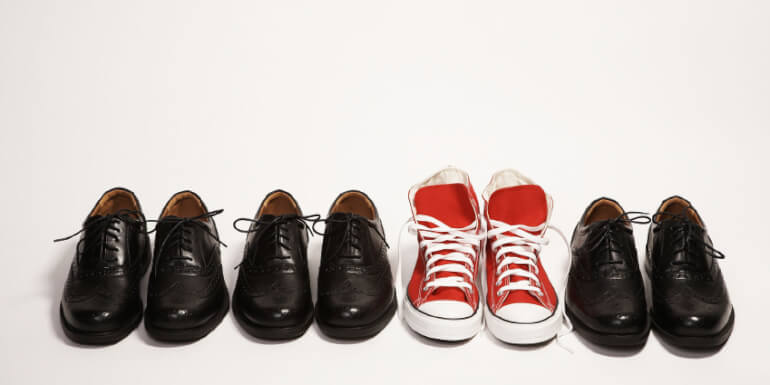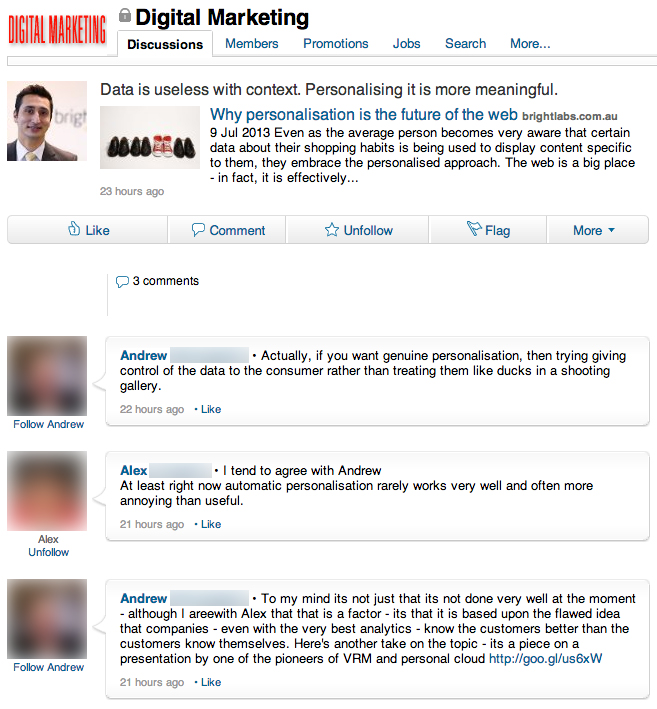Why personalisation is the future of the web
Consumers are more willing than ever to exchange data for a more personalised and relevant online shopping experience. Let us have a look what the future of personalisation entails.

Even as the average person becomes very aware that certain data about their shopping habits is being used to display content specific to them, they embrace the personalised approach.
The web is a big place - in fact, it is effectively boundless - and that means millions of brands are vying for attention.
To aid them in their efforts, companies are gathering and storing consumer data at a rampant pace but the use of that data is only in its infancy. As more ways to use and parse that data appear, personalisation becomes a promising possibility. Let us look what the future of personalisation entails.
What makes personalisation possible?
Personalisation is what comes in response to "Big Data".
Data is useless without context. This need for context means that companies will have to know what they are looking for, in terms of analysing data, to create a personalised shopping experience for consumers.
This brings us into the field of "behavioural analytics"; that is, the ability to examine user data in order to predict what the individual might want to do next. This gives brands the ability to target individuals based on what they like, by predicting what they will like.
What about privacy concerns?
Many people show concern around online privacy (notably, basically everyone in the United States, as of late), but data from Accenture Interactive shows that consumers accept that companies use data to personalise the shopping experience.
What's more, according to that same survey, poses this question:
"…How receptive would you be if your favourite store/brand kept track of your purchases and shopping behaviour to inform your future purchases and help you know what is available?"
The response was mixed, but 47% responded that they would be "very receptive" to such efforts. Only 8% responded "not at all receptive".
What are curious, are the answers given to Accenture Interactive's next question, which is:
"Are you concerned with websites tracking your behaviour?"
The survey respondents, from the UK and USA respectively, answered that they are concerned (86%). This is compounded by the fact that the same respondents say that the ability for companies to present relevant offers to them is more important than having companies no longer track them.
| Update on 12/07/13: Some of our friends on LinkedIn have let shared some alternate viewpoints when it comes to the future of online personalisation. We thought their opinions were fair and we love the fact that they have added to the dialogue - they may just be right, too. Below, we've covered their responses and share some of our own thoughts around their ideas. |
Now, the alternate viewpoint
Here's what was said from a discussion in the Digital Marketing group on LinkedIn.

The link Andrew provided offers readers an insightful piece from Which-50 that explains Doc Searls' prediction that the "personal cloud" is about to emerge.
Searls predicts that, like PC and mobile computing unlocked the personal creativity of individuals, the advent of personal cloud-based computing will wrest the advantages of Big Data and personalisation from the hands of corporations and put the power squarely in the hand of consumers.
Searls' offers up the following example in the article:
- "Imagine if Canon shipped the camera with that QR code and behind that QR code was the personal cloud for that camera. So I am buying the cloud along with the camera itself. When I buy the product I get the cloud and if I sell the camera the cloud goes with it."
That statement leads us to follow up with:
- "Well, how much does Canon (for example) know about me and how I use my camera?"
- "The cloud" is new in name only
With the above feedback and discussion in mind, let's further the dialogue.
Does that unique device Searls describes not automatically create a completely personalised, individualised consumer in the same way that an individual's purchasing through the Apple Store, Amazon Kindle Store, and Google Play Store facilitates the gathering of highly-specific consumer data?
Although, it is easy to see that an increased prevalence of personal devices will create personal control over data, but the influx of devices is also ushering in a greater focus on sales channels.
Searls is correct that some personalisation - mannequin-mounted all-seeing-all-knowing cameras, for example - is too intrusive to be socially, perhaps morally, acceptable. But, what Searls is forgetting, or simply omitting, is that "the cloud" is not an actual thing floating over a device. Ok, we're sure he knows this but for everyone else, it is storage space on a server, shared by a consumer and a company, and what that company does with its 'cloud' comes down to legalities and terms of service agreements, just as everything else on the web these days.
Will the future be more private but more channel-specific?
The increasing number of mobile devices, and the slow and gradual transition to those devices that is apparently taking place across the board, does create a more channel-specific digital experience.
It seems that, while the consumer may use their personal cloud to gain additional privacy from random companies, if the personal cloud is widely adopted, it will remain a tool to strengthen the sales channels the consumers agrees to do business with.
So, what do you think?
It's safe to say that Andrew and Alex have raised some great points in response to our opinions, and we're really glad that they provided some other perspectives.
Those of us working in the digital space are writing the future of the web as a tool for business together, with respect to the obvious limiting factors put in place by consumers.
How will we adapt to the consumers' awareness of privacy concerns on the web? Technology is simultaneously presenting us with the tools to make a personalised web experience that is non-obtrusive, while consumers are more demanding of control over their data than ever. What other ideas are out there?
The future of personalisation
Unsurprisingly, analyses like the one above are showing us that consumers are grappling with what behavioural analytics can do. The fact is, even in spite of privacy concerns, more consumers are doing business online - even preferring to do so - every day. As more brands learn to make better use of Big Data segmentation and analysis, the challenge becomes creating a personalised shopping experience that fits with consumers' privacy expectations. That is no small task.
What will work is a continual focus on delivering relevant content that is not intrusive for the sake of being intrusive. As behavioural analysis is refined, the content sent to consumers through the web and on mobile platforms has to respond to modern shopping sensibilities. Largely, users have said, "a little intrusion is okay, as long as it means something to me."
For brands, this means highlights the need for value-added content more than ever. personalisation is coming, inevitably; it is up to businesses to make sure it is worth it to their customers.
Are you interacting with your customers in a personalised way that has value for them?





